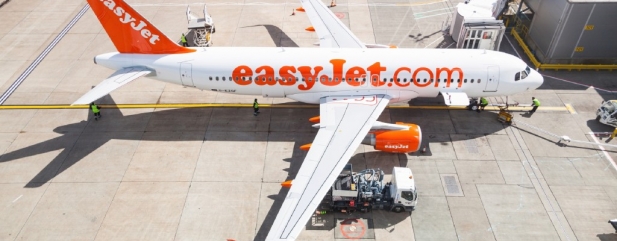Archived article
Please note that tax, investment, pension and ISA rules can change and the information and any views contained in this article may now be inaccurate.
EasyJet could benefit from Ryanair and Monarch problems

Low-cost airline EasyJet (EZJ) could benefit from the recent drama surrounding its rivals Ryanair (RYA) and Monarch.
Ryanair has dominated the headlines over the past few weeks after cancelling thousands of flights due to an issue with pilots’ rosters. That’s caused severe brand damage and could prompt travellers to shun the airline near term.
The damage is not yet evident in its passenger statistics as the latest figures (3 Oct) show a 10% hike in customers to 11.8m in September.
The UK’s fifth largest airline Monarch went into administration on 2 October, leading to the cancellation of 300,000 future bookings. That effectively creates an opportunity for other airlines to capitalise on reduced competition.
EasyJet is widely expected to be among the airlines interested in acquiring assets from Monarch out of administration with airport slots seen as one of the major prizes.
How has the stock market reacted?
We’ve looked at how airline share prices have moved over the past three weeks which encapsulates the full period of industry disruption.
Ryanair is down 6% to €16.92, EasyJet is up 6% to £12.83, Wizz Air (WIZZ) is up 4% to £30.10 and British Airways’ owner International Consolidated Airlines (IAG) is up 1% to 608p. The market is clearly pricing in a more favourable position for EasyJet.
Bull and bear case
UBS analyst Jarrod Castle says EasyJet is likely to benefit from Ryanair’s issues as the customer base overlaps more with Ryanair’s than British Airways.
Castle is also encouraged by EasyJet’s planned investment in a new cloud-based data hub that should provide personalised offers and information to travellers.
However, not everyone is impressed. Canaccord Genuity analyst Nigel Parson concedes that increased digitisation should improve efficiency and cost reductions, but he argues that the company faces some ‘harsh realities’.
‘The problem for EasyJet is that passenger yields are under pressure and likely to remain so in the near term,’ says Parson.
He says competition at many of the airline’s bases has increased significantly in recent years and that this is expected to continue.
Despite the recent flight cancellations and reduced capacity growth, Parson reiterates Ryanair as his top choice due to its ‘cost base, superior margins and strong growth into primary and higher yielding airports’.
Important information:
These articles are provided by Shares magazine which is published by AJ Bell Media, a part of AJ Bell. Shares is not written by AJ Bell.
Shares is provided for your general information and use and is not a personal recommendation to invest. It is not intended to be relied upon by you in making or not making any investment decisions. The investments referred to in these articles will not be suitable for all investors. If in doubt please seek appropriate independent financial advice.
Investors acting on the information in these articles do so at their own risk and AJ Bell Media and its staff do not accept liability for losses suffered by investors as a result of their investment decisions.

 magazine
magazine









